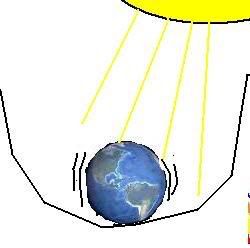Theres another theory called Global Dimming that essentially says that man made pollution is actually compensating for itself in terms of temperature rise, by polluting the atmosphere that causes clouds to reflect much more sunlight than usual due to high amounts of polluted particles inside them.
This added reflectivity obviously means less sunlight actually gets to the surface and the net effect is a cooling of the planet. The implications of this are that it may well be the case that man made global warming could turn out to cause a much bigger impact on temperature rise than was first thought, given that the same environmental pollution that causes sunlight to be trapped is also causing it to be reflected.
If we completely cut down on man made pollution world wide the huge amount of "dirty cloud" coverage on the planet would drop very quickly (an example is smog over large cities) but the CO2 levels would drop much more slowly. The atmosphere would still be trapping a lot of heat but would no longer be reflecting as much sunlight. In effect, cutting down on pollution worldwide may actually make things a lot worse before better.
About large masses of ice melting, such as the north pole: Ice is obviously very reflective, and thus reflects a lot of sunlight. It's been shown by scientists that a large reduction in the amount of ice on the planet would cause a considerable reduction in the amount of sunlight reflected and would thus accelerate global warming. This is what worries me about global warming - it isnt linear.
Here is a BBC Horizon episode on
Global Dimming. Definately worth a watch.


